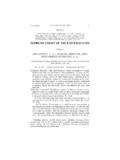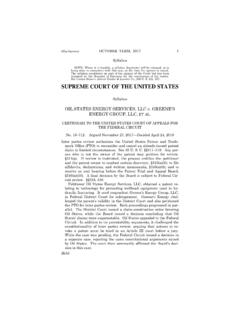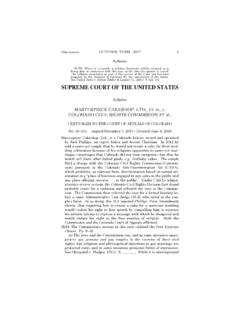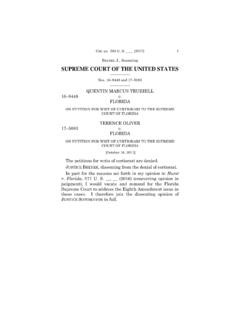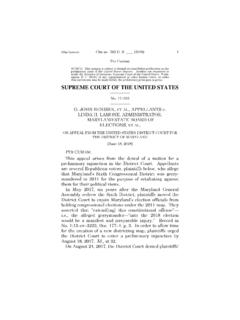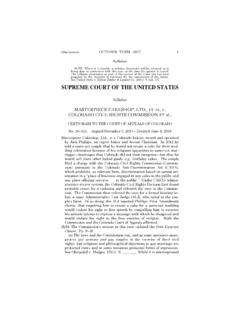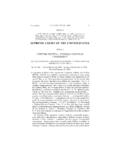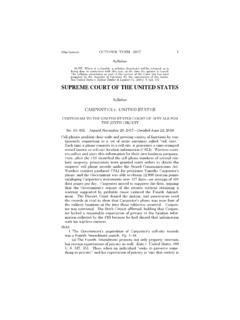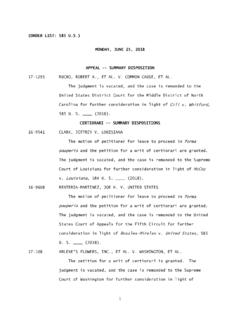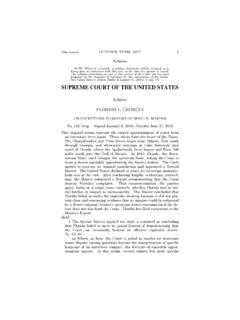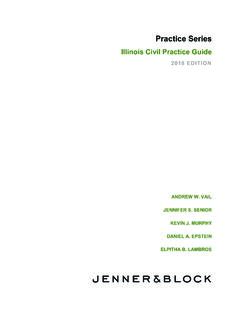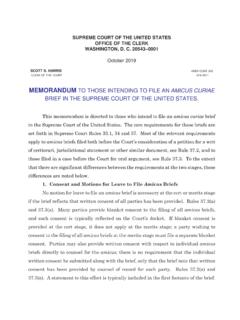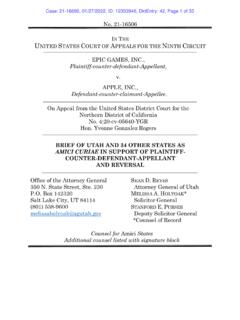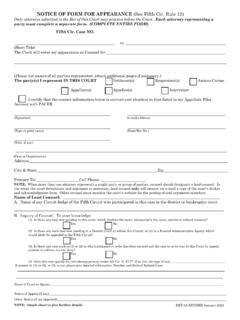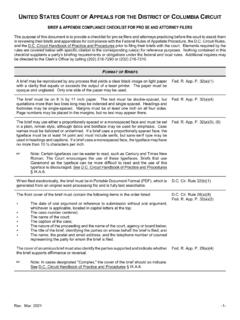Transcription of In The Supreme Court of the United States
1 No. 18-556 ======================================== ======================== In The Supreme Court of the United States --------------------------------- --------------------------------- STATE OF KANSAS, Petitioner, v. CHARLES GLOVER, Respondent. --------------------------------- --------------------------------- On Petition For A Writ Of Certiorari To The Supreme Court Of Kansas --------------------------------- --------------------------------- amicus CURIAE BRIEF OF OKLAHOMA, ARKANSAS, COLORADO, GEORGIA, INDIANA, KENTUCKY, MICHIGAN, NEBRASKA, OHIO, UTAH, AND WYOMING AS AMICI CURIAE IN SUPPORT OF PETITIONER --------------------------------- --------------------------------- MIKE HUNTER attorney General of Oklahoma MICHAEL K. VELCHIK RANDALL YATES Asst. Solicitors General MITHUN MANSINGHANI Solicitor General Counsel of Record OKLAHOMA OFFICE OF THE attorney GENERAL 313 NE Twenty-First St. Oklahoma City, OK 73105 (405) 522-4392 @ [Additional Counsel Listed On Inside Cover] ======================================== ======================== Counsel for Amici LESLIE RUTLEDGE attorney General of Arkansas BILL SCHUETTEA ttorney General of MichiganCYNTHIA H.
2 COFFMAN attorney General of Colorado DOUG PETERSON attorney General of NebraskaCHRIS CARR attorney General of Georgia MICHAEL DEWINE attorney General of OhioCURTIS T. HILL, JR. attorney General of Indiana SEAN D. REYES attorney General of UtahANDY BESHEAR attorney General of Kentucky PETER K. MICHAEL attorney General of Wyoming i TABLE OF CONTENTS Page TABLE OF AUTHORITIES .. iii INTERESTS OF AMICI CURIAE .. 1 SUMMARY OF THE ARGUMENT .. 2 ARGUMENT .. 3 I. The Decision Below Undermines Law Enforcement s Efforts To Promote Public Safety .. 3 A. Unlicensed drivers present a signifi-cant risk to public safety .. 4 B. Police officers have limited means to combat motorists driving with sus-pended licenses .. 6 II. This Petition Presents A Compelling Vehi-cle To Address The Important Question Presented .. 9 III. The Decision Below Is Wrong .. 11 A. It is reasonable to infer that the regis-tered owner is the driver, absent con-trary information.
3 11 B. Where the registered owner of a vehi-cle is unlicensed to drive, an officer has a particularized and objective basis for suspecting legal wrongdoing .. 16 C. Reasonable suspicion may be drawn from otherwise lawful acts .. 17 ii TABLE OF CONTENTS Continued Page D. Police officers often cannot safely obtain any additional information about the driver without conducting a brief investigatory stop .. 18 E. The majority rule adequately protects the rights of law-abiding citizens .. 21 CONCLUSION .. 23 iii TABLE OF AUTHORITIES Page CASES Alabama v. White, 496 325 (1990) .. 4, 10 Armfield v. State, 918 316 (Ind. 2009) .. 7, 8, 20 Brendlin v. California, 551 249 (2007) .. 3 Delaware v. Prouse, 440 648 (1979) .. 1, 4, 7, 12, 13 Illinois v. Gates, 462 213 (1983) .. 12 Illinois v. Wardlow, 528 119 (2000) .. 18, 21 Missouri v. McNeely, 569 141 (2013) .. 4 Navarette v. California, 572 393 (2014).
4 21 Nutraceutical Corp. v. Lambert, No. 17-1094 ( ) .. 10 Ornelas v. United States , 517 690 (1996) .. 11 Reid v. Georgia, 448 438 (1980) .. 18 State v. Donis, 723 35 ( 1998) .. 7 State v. Hess, 648 913 ( App. 2007) .. 8, 19 State v. Martinez-Arvealo, 797 181 (Ga. App. 2017) .. 8 State v. Neil, 207 296 (Mont. 2009) .. 19 State v. Pike, 551 919 (Minn. 1996) .. 8, 19, 22 State v. Richter, 765 687 ( 2000) .. 19 State v. Seward, No. 43658, 2016 WL 5266624 (Idaho App. Sept. 22, 2016) .. 19 State v. Tozier, 905 836 (Me. 2006) .. 20 iv TABLE OF AUTHORITIES Continued Page State v. Turner, 416 872 (Ariz. Ct. App. 2018) .. 21 State v. Vance, 790 775 (Iowa 2010) .. 8, 9, 20, 21, 22 State v. Weber, 139 519 (La. 2014) .. 13 Terry v. Ohio, 392 1 (1968) .. passim United States v. Arvizu, 534 266 (2002) .. 10, 16, 18 United States v. Brignoni-Ponce, 422 873 (1975) .. 3, 7 United States v. Chartier, 772 539 (8th Cir.)
5 2014) .. 8, 20 United States v. Cortez, 449 411 (1981) .. 15, 17 United States v. Cortez-Galaviz, 495 1203 (10th Cir. 2007) .. 12, 13, 16 United States v. Pyles, 904 422 (6th Cir. 2018) .. 12 United States v. Sokolow, 490 1 (1989) .. passim Village of Lake in the Hills v. Lloyd, 591 524 (Ill. App. 2d Dist. 1992) .. 12 Virginia v. LeBlanc, 137 S. Ct. 1726 (2017) .. 10 Walker v. Texas Div., Sons of Confederate Veterans, Inc., 135 S. Ct. 2239 (2015) .. 7 CONSTITUTIONAL PROVISIONS Const. amend. IV .. passim v TABLE OF AUTHORITIES Continued Page RULES Sup. Ct. Rule .. 1 OTHER AUTHORITIES AAA Foundation for Traffic Safety, Unlicensed to Kill 2 (Nov. 2011) .. 4 Barry Watson, The Crash Risk of Disqualified/ Suspended and Other Unlicensed Drivers, PRO-CEEDINGS OF ROAD SAFETY RESEARCH, POLICING & EDUC. CONF. 181 (2002) .. 5 David J. DeYoung et al., Estimating the exposure and fatal crash rates of suspended/revoked and unlicensed drivers in California, 29(1) ACCIDENT ANALYSIS & PREVENTION 17 (1997), available at abs/pii/S0001457596000565.
6 14 K. James Kallail et al., The influence of license status on Kansas child fatalities due to motor vehicle crashes, 15(2) INT L J. OF INJURY CONTROL & SAFETY PROMOTION 77 (2008) .. 5 Mary Callahan, Guerneville man dies of injuries in Highway 116 crash, The Press Democrat (Feb. 24, 2012), available at man-dies-of-injuries .. 6 NHTSA, Trends in Fatal Crashes Among Drivers With Invalid Licenses (Dec. 2009) .. 4 vi TABLE OF AUTHORITIES Continued Page Paul Payne, Unlicensed driver sentenced to four years in prison in fatal Santa Rosa crosswalk crash, The Press Democrat (June 29, 2012), available at news/2317379-181/unlicensed-driver-sente nced- to-four?gallery=2356207 .. 6 Report: Beware of Unlicensed drivers, ABC NEWS (July 13, 2018), available at https://abcnews.. 14 Stephanie Blows et al., Unlicensed Drivers and Car Crash Injury, 6(3) TRAFFIC INJURY PRE-VENTION 230 (2005) .. 5 Sukhvir S. Brar, Estimating the over-involve-ment of suspended, revoked, and unlicensed drivers as at-fault drivers in California fatal crashes, 50 J.
7 SAFETY RESEARCH 53 (2014) .. 5 The 10 States with the Most Suspended/Revoked Licenses, Insurify (June 4, 2018), available at the-most-suspended-revoked-licenses/ .. 5 Census Bureau, QuickFacts, Kansas, avail-able at .. 13 1 INTERESTS OF AMICI CURIAE Amici curiae are the States of Oklahoma, Arkan-sas, Colorado, Georgia, Indiana, Kentucky, Michigan, Nebraska, Ohio, Utah, and They operate their own motor vehicle licensing agencies and are re-sponsible for ensuring the safety of motorists, passen-gers, and pedestrians, as well as enforcing the criminal laws of their state. Drivers license and registration re-quirements are essential elements in a highway safety program, and the States have a vital interest in ensuring that only those qualified to do so are per-mitted to operate motor vehicles. Delaware v. Prouse, 440 648, 658 (1979). This case involves a challenge to the constitution-ality of a standard and frequent practice of state law enforcement officers: stopping motor vehicles known to be registered to individuals with suspended licenses, or having outstanding arrest warrants, in order to ver-ify whether the driver is committing or has committed a crime.
8 Studies show that despite having their license suspended, many drivers continue to drive their vehi-cles. And because unlicensed drivers account for a dis-proportionate share of motor vehicle accidents, such stops are often the sole, indispensable means available to officers to police against this important public safety hazard. The decision below severely undermines the abil-ity of state officers to keep their streets safe. It injects unnecessary uncertainty in States across the country 1 Amici submit this brief pursuant to Sup. Ct. Rule All parties received notice of amici s intention to file this brief. 2 as to whether officers can continue employing this standard law enforcement practice. This in turn jeop-ardizes the lives of lawful drivers, passengers, and pedestrians everywhere. Accordingly, amici States have a substantial interest in this Court s disposition of the case. --------------------------------- --------------------------------- SUMMARY OF THE ARGUMENT The question presented implicates a frequently re-curring problem that police officers face when combat-ing a significant public safety hazard: unlicensed drivers.
9 Numerous studies have documented that un-licensed drivers are statistically more likely to be in-volved in automobile accidents, and that these crashes tend to be especially severe. Studies also show that drivers who have their licenses revoked nevertheless continue to drive with alarming frequency. Ordinarily, police officers lack the tools to identify unlicensed driv-ers on the road. But when an officer runs a license plate and discovers that the vehicle s registered owner is unlicensed to drive, the officer has reasonable suspi-cion to stop the car and investigate whether the driver is in fact unlicensed. Yet the Court below broke with the considered judgment of six Courts of Appeals in holding that even in these limited circumstances, po-lice officers may not stop a car absent further corrobo-rating evidence that the driver is in fact unlicensed. In so holding, the Court failed to acknowledge that officers will often be unable to obtain any further information about the driver whether because of nightfall, the 3 weather, tinted windows, or traffic conditions.
10 Thus, if left to stand, the decision below will severely under-mine law enforcement s ability to police against unli-censed drivers. The Petition presents a compelling vehicle to re-solve this issue. There are no facts in dispute, and the legal question has been passed upon by numerous lower courts, which have fully ventilated the argu-ments on each side. Because the decision below is wrong and jeopardizes public safety, this Court should grant review. --------------------------------- --------------------------------- ARGUMENT I. The Decision Below Undermines Law Enforcement s Efforts To Promote Public Safety. Every day, law enforcement officials patrol Amer-ica s streets to protect ordinary citizens from fleeing criminals, drunk drivers, and unsafe motorists. When a lawbreaker is ensconced in a vehicle, officers often do not have the benefit of examining facial expressions, spoken words, or furtive gestures.
